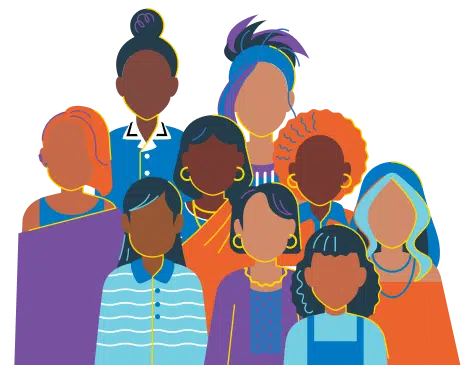Media Centre - Media release - 1 October 2019
Gender inequality in movies: The world’s most popular films are overwhelmingly sexist

The world’s most popular films are sending the message to girls and young women that leadership is mostly for men, according to new research launched today by Plan International and the Geena Davis Institute on Gender in Media.
The girls’ rights charity is releasing the research today, to launch its Give Equal campaign: asking everyday Australians to pledge a donation to help girls to overcome barriers to become leaders and have their voices heard.
The audit of the top-grossing films in 2018 found women leaders – be they presidents, CEOs or business owners – are often portrayed as sex objects, shown in revealing clothing or even naked on the big screen.
The research, which analysed the 56 top-grossing films of 2018 in 20 countries, found that of the characters in leadership positions:
- Women and girls were four times more likely than men to be shown wearing revealing clothing (30% compared to 7%)
- Nearly twice as likely to be shown as partially nude (15% compared to 8%)
- Four times more likely to be shown completely naked (2% compared to 0.5%)
- Women in leadership positions are also more likely to be sexually objectified than men, with 15% having the camera focused on their body parts in slow motion compared to 4% of men.
Hayley Cull, Plan International Australia Advocacy Director, said the research was ‘deeply concerning’.
It is deeply concerning that in 2019, harmful sexist stereotypes still dominate on screen.“Our research shows women are rarely portrayed as leaders on screen, and when they are they’re far more often sexualised than men. This undermines girls and young women and has a negative impact on their aspirations to leadership in all walks of life, because it’s true that you can only be what you can see. Girls deserve more than this.”
Geena Davis, an acclaimed actor who has starred in feminist films including Thelma and Louise, and chair and founder of the Geena Davis Institute on Gender in Media at Mount Saint Mary’s University, said:
“Film and media powerfully influence how the world views girls and how they view themselves. Girls need to see themselves reflected on screen and to see positive and authentic characters that can inspire them. Content creators and storytellers in entertainment and media have an opportunity to support and influence the aspirations of girls and women and stop reinforcing damaging gender stereotypes.”
Ms Cull said the research findings were just one example of the systemic gender inequality that prevails worldwide.
“We don’t just see gender inequality on our screens, we see it every day in countries around the world. Gender inequality holds girls back from reaching their potential. It leads to horrific injustices like limited or no opportunities to get an education, a career or to be a leader. It leads to child marriage, early pregnancy and poverty.
“We can’t change the past but we can change the future. That’s why we’ve launched our new campaign Give Equal, which raises much needed funds to provide girls in developing countries with education, and opportunities to lead and thrive. We know it can make a difference – and that creating a better now for girls, means a better future for everyone.”
Using the Geena Davis Inclusion Quotient, a pioneering machine learning software tool, the research analysed the 56 top-grossing films across the United States, India, Dominican Republic, Canada, Denmark, Germany, Honduras, Japan, Netherlands, Peru, Philippines, Vietnam, Sweden, Finland, South Sudan, Benin, Uganda, Sierra Leone, Zimbabwe and Senegal.
Combined, these films earned more than $21 billion at the box office and were viewed by millions around the world.
The report Rewrite her story: How film and media stereotypes affect the lives and leadership ambitions of girls and young women reveals that there are twice as many men as women in the films – 64% compared to 36% – and they speak twice as much (67% compared to 33%).
Men in leadership positions are also much more visible: 42% of men, compared to 27% of women, are shown on screen as leaders.
Of all the characters analysed, not just those in leadership positions, women are almost four times more likely than men to be shown in revealing clothing (26% compared to 7%); nearly twice as likely to be shown as partially or fully naked (15% compared to 9%) and more likely to be portrayed as sex objects through having the camera focused on their body parts in slow motion (9% compared to 5%).
“In the Dominican Republic, films and adverts often focus on women’s bodies, showing women in revealing clothes, rather than showing their intelligence,” said Marelin, 19, a young activist campaigning alongside Plan International in Dominican Republic.
“I’d like films and adverts to represent women as more enterprising and determined, strong and powerful, so my message for the filmmakers and advertisers out there is that they should show women in roles like president, prime minister, entrepreneur or business executive so that it inspires girls to become leaders.”
Eighteen-year-old Ruby, one of the frontline youth activists of Plan International India in her community in the southern outskirts of Delhi, says the films produced in Bollywood also have a negative impact on girls’ confidence and ambition.
Women are often relegated to play dance numbers and just treated as objects of attraction,- she says.
“If the character is a politician, it’s always a man who plays the part. For women in politics it is assumed that the only way they reach corridors of power is by compromising their integrity. On screen and in real life, girls and women are devalued and it is accepted as normal. This has to change.”
Give Equal kicks off on October 11, the International Day of the Girl. Those who join will pledge to donate the amount they spend on a chosen ‘nicety’ during the month of October, to help provide girls with everyday necessities, like education and sanitation.
Notes to Editors
- In 2018, women comprised just 20% of all directors, writers, producers, executive producers, editors, and cinematographers working on the top 250 domestic grossing films.
- Only 1% of films employed ten or more women in the above roles. In contrast, 74% of films employed ten or more men.
- The research set out to analyse the 10 top-grossing films across the 20 countries, but there was a significant overlap among these films, with a majority of the films produced in the US.
- For the purposes of this research, a position of leadership was defined as involving “leading people or an organisation”, which included political and business leaders as well as characters who were leaders in their community or in the home.
- Plan International and the Geena Davis Institute’s previous research into girls’ leadership ambitions, Taking the Lead, found that three-quarters of 15-24-year-old girls aspire to be leaders, but 9 out of ten believe women leaders aren’t treated as well as men in leadership positions and 9 out of 10 expect women leaders to be sexually harassed. What they see in films reinforces those expectations.
About Plan International
Plan International is a leading girls’ rights agency. We champion girls’ rights because we know that there is nowhere in the world where girls are treated as equals. We work alongside children, young people, supporters and partners to tackle the root causes of injustices facing girls and the most marginalised children. Plan International works in more than 75 countries to help create a just world that advances children’s rights and equality for girls. Our local office, Plan International Australia funds programs to support children in more than 25 countries, as well as sponsorship programs across the federation.
About Geena Davis Institute on Gender in Media
The mission of the Geena Davis Institute on Gender in Media is to engage, educate, and influence media content creators, marketers, and audiences about the importance of eliminating gender bias and stereotypes in media. The Institute has amassed the largest body of research on gender prevalence in family entertainment, spanning more than 20 years. Research findings are in high demand by companies and organisations interested in the empowerment of women and girls. The Institute’s research serves as the basis for education and outreach programmes that help families, studios, educators and content creators become critical consumers and producers.
Media contacts


